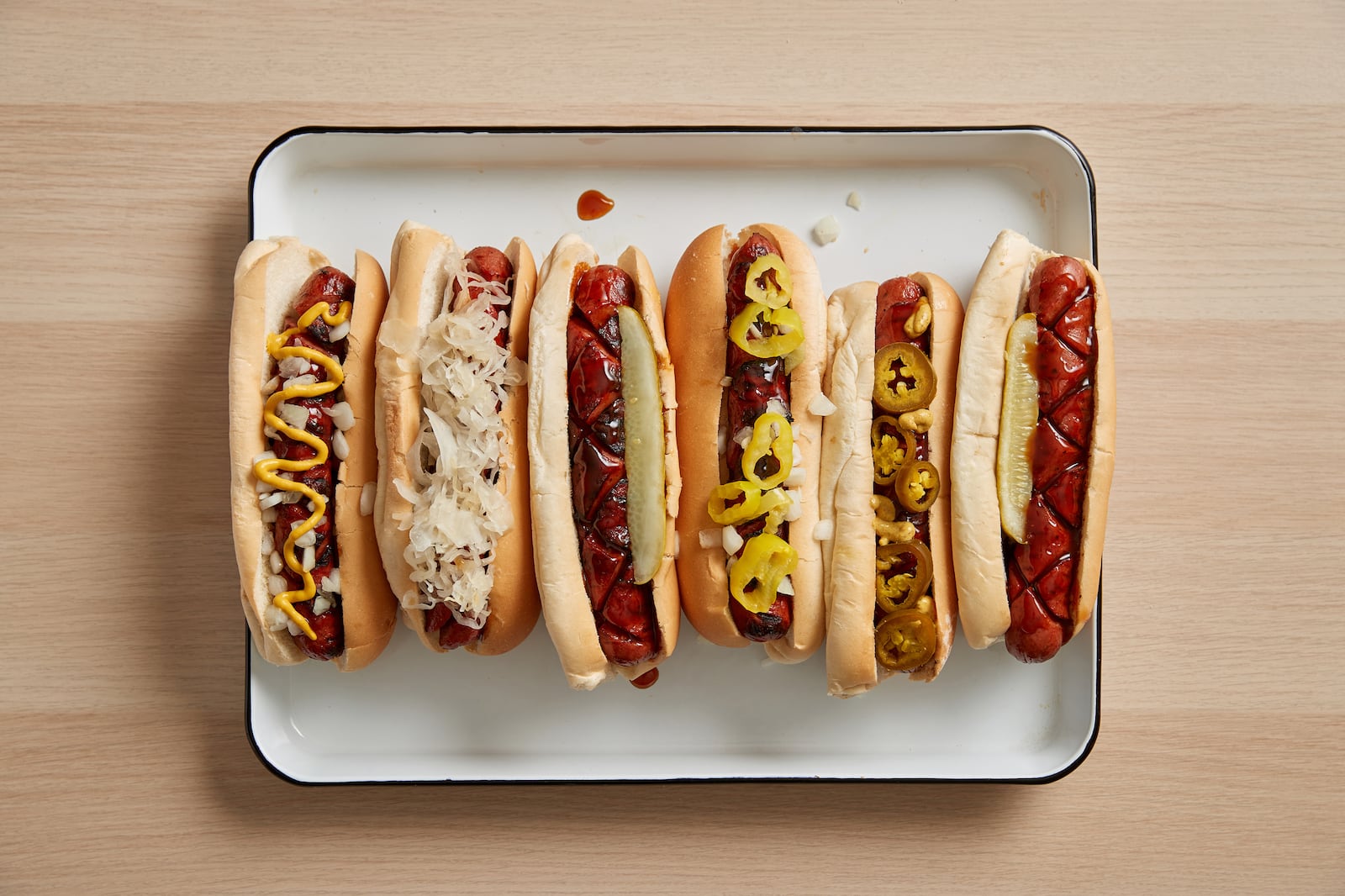This story appears in the April 2025 issue of Utah Business. Subscribe.
Hot dog empires start in curious ways.
Over 20 years ago, Jayson Edwards was a freshman at Brigham Young University (BYU) majoring in Asian studies. He had no car and walked from home along the south side of the Provo campus to attend classes. Each day, he passed by a 10′ by 10′ dilapidated shack with busted windows that displayed upcoming benefit concert posters and little else. A closer inspection revealed it didn’t even have a floor. What it did have was dry rot.
Put blunter, the place was a dump. At the same time, Edwards could see possibility in it: He thought it’d be perfect as a hot dog stand.
Before enrolling at BYU, Edwards was a missionary for The Church of Jesus Christ of Latter-day Saints in faraway Toronto. Hot dog vendors were a regular sight and often saved him from traveling home for dinner. The price was always right at $2 (a coin called a “toonie”).
“We would eat like kings,” he says.
According to Edwards, J. Dawgs now has 10 locations statewide. Its Polish or beef “dawgs” with special sauce are a staple in half a dozen local sports arenas, and a growing army of 300+ employees ensures its customers never go hungry.
Before 2004, though, J. Dawgs was only an idea. And as ideas went, it wasn’t even Edwards’ favorite.
From dream to dawg
A Marriott School of Business class taught by Stephen Gibson inspired Edwards, and he took to daydreaming, jotting down business ideas as he did so. Far down on the list — his eighth choice — was to open a hot dog stand.
Edwards claims he was hardly business-minded at first. He’d never peddled chocolate bars door to door in his native Portland or dreamed up any get-rich-quick schemes in his youth. But he did begin considering possibilities when his dad, a firefighter-turned-administrator, shared time-tested advice he never let go of.
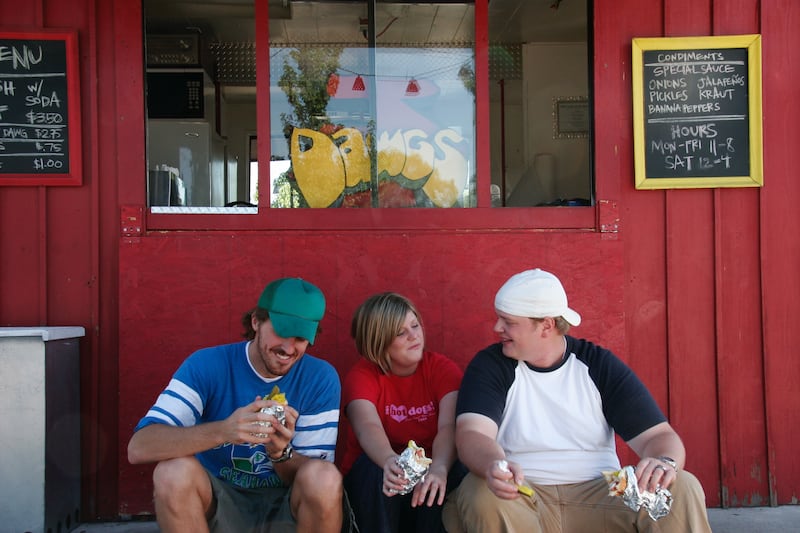
“He told me to find what I enjoyed doing the most first, then figure out how to turn that into a career,” Edwards says.
Enough thought about the hot dog stand at last led to action, and Edwards tracked down the aforementioned shack’s owner in Arizona and struck a deal. Was paying $300 a month in rent worth it? Truth be told, he had no clue.
“I had no prior knowledge of leases or contracts,” Edwards says about choosing to gamble on himself. “But what I wanted to make happen seemed 100 percent possible.”
First on Edwards’ to-do list was making the shack presentable. Because he was a broke university student, that meant selling his Fender 52 Telecaster Reissue guitar — the one with the pretty butterscotch finish — to his dad for $600. Lots of trips to and from Home Depot on the city bus followed. With no nearby power source to tap into, Edwards borrowed a generator and got to work.
In the summer of 2004, after three months of refurbishing, a health inspector approved the first-ever J. Dawgs location for a business license. Shortly after that, Edwards sat on a nearby curb as student after student filed off of campus. Witnessing that steady flow of foot traffic, he had the distinct feeling he’d chosen his spot correctly. Something big was set to happen. A banner was attached to his made-prettier shanty with two words: “Wanna Weiner?”
That question created the Pavlovian response he’d hoped for. On J. Dawgs’ opening day, long lines led up to the order window. Edwards had no employees apart from himself. He had no cash to make change and even had to ask his mom to wire him funds to make that happen. At the end of the day (and every day after that), he collected his earnings and stashed them in a Mason jar stored in his underwear drawer.
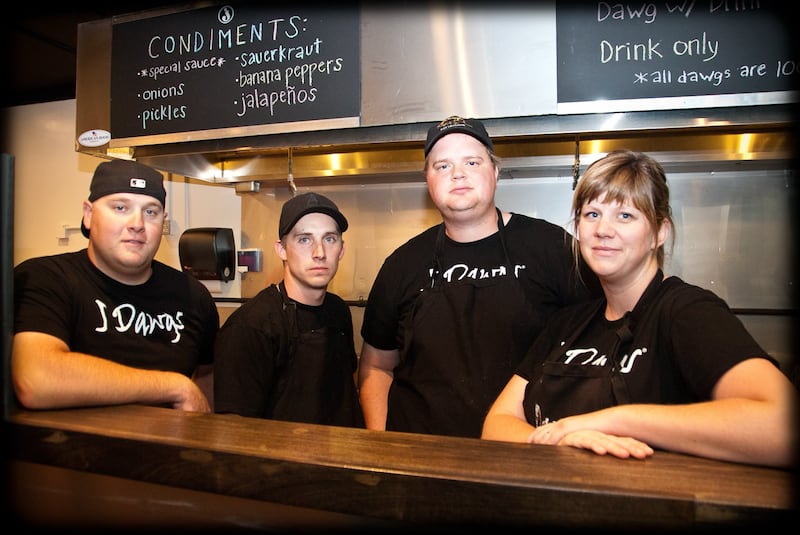
“It was so simple but incredibly fulfilling,” Edwards says of his first location. “You hear stories about people starting companies in garages, and they recall the experience with such fondness. That’s exactly how I feel about the shack.”
Success was a slow burn at first, but sales were steady. On the last day of his first summer, he sold a company record of 100 hot dogs.
When school started up again in the fall, The Daily Universe — the school newspaper — put Edwards on its front page and kicked J. Dawgs into overdrive. Business was so good that he decided to drop out of school and grill full time. He didn’t know it then, but that was a preview of the next 20 years of his life.
“I never anticipated that 21 years later J. Dawgs would be something I still really enjoy, but it’s been the ride of a lifetime,” Edwards says. “I have no formal business training, but even a blind squirrel finds the acorn sometimes.”
“Do you want to run a one-chair barber shop or a Supercuts?”
In a way, marrying his wife led Edwards to open more J. Dawgs restaurants.
But first, a love story.
When Heidi ordered a dog from Edwards one night, he immediately asked her out. She said yes, and he responded in the exact way he should have — he took her on a date the same night, right after business hours ended. When she asked how much time he usually spent at that shack, his answer was honest: every waking moment. He would return after their dinner together ended, as he had to prepare for his next day.
“When she offered to help and was on her hands and knees scrubbing the floor within the hour, that was it,” Edwards says. “I was a goner.”
They married a short four months later.
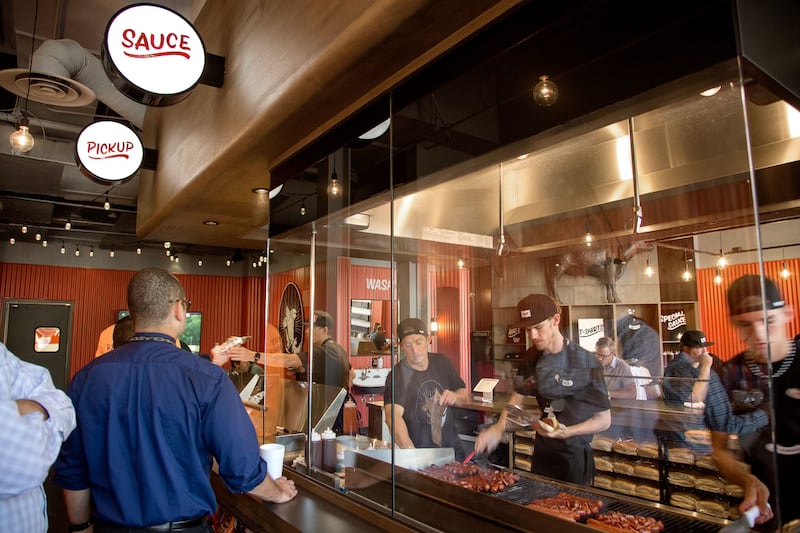
Edwards didn’t know then that he’d married into a business-minded family. His new father-in-law ran BYU’s entrepreneurship program and made a point of asking Edwards if he wanted to “run a one-chair barber shop or a Supercuts,” the implication being that he needed to grow J. Dawgs into a bigger entity. Surely, one stand wasn’t enough.
When a store space opened near him in Provo, Edwards seized the opportunity to expand. Doing so led to an accessible bathroom and heat, and his employees were able to work in a tempered environment. Sales went through the roof, leading to the opening of another location in nearby Orem. “And it was a game-changing move for us,” Edwards says.
A restaurant in Lehi followed, which was also wildly successful. Edwards hired high school students who wanted to work hard — and, in turn, J. Dawgs contributed to school programs. Being printed on banners at ball games helped drive brand awareness and restaurant visits. It’s been a largely successful strategy, and a string of restaurants has followed.
“They haven’t all been grand slams,” Edwards admits. “Some have been singles or doubles, but most have been good news.”
Keeping the menu simple has helped. At its onset, J. Dawgs was little more than hot dogs and soda. Apart from wanting to adhere to an easy menu of a few offerings, Edwards also had a space issue; there wasn’t room for much more than beef and Polish dogs. Edwards purchased both from a local establishment in Salt Lake City until it shuttered. Once it did, he was fortunate to buy their recipes.
“Grilling dogs. Cleaning tables. Taking the trash out. Chatting with customers. Those are still what I love doing the most.”
— Jayson Edwards
When the restaurant became a Delta Center standard and started grilling for the Utah Jazz and its fans, a new side item was strongly encouraged. It took some convincing, but Edwards finally caved — he and his crew landed on offering fries. A seasoning called Uncle Tobe’s Fry Dust was added, a nod to Edwards’ longtime friend and J. Dawgs’ COO Toby Thompson. Now, fries are purchased nearly as regularly or more than hot dogs.
“When games clock in at over three hours, we’ll often have higher sales in a single day than some of our stores have in a week,” Edwards says, adding that, at a recent March Madness tournament, he spent 12 straight hours on the grill. This earned the company another achievement: a six-figure sales day.
A family recipe
Shortly after opening in 2004, Edwards introduced a new flavor to the short list of J. Dawgs offerings: Special Sauce.
“The sauce has been around even longer than J. Dawgs has,” Edwards says. “My grandma clipped a recipe out of the newspaper in the 1940s while my grandpa was away and learning to fly in the United States Army Air Corps. She fiddled with it, adjusted it to her tastes, and it became a family favorite.”
When Edwards returned home for Christmas during his first year in business, his mom was simmering Lit’l Smokies in the sauce. A light went on — the sauce he grew up with would be perfect with his dawgs. His mom graciously showed him how to make it, and he added the sauce to the chain’s strategically simple menu.
While the sauce is currently available for sale in all J. Dawgs locations, Edwards says it’s set to land on many more shelves very soon. His goal is to have Special Sauce readily available for purchase at local supermarkets by the end of 2025.
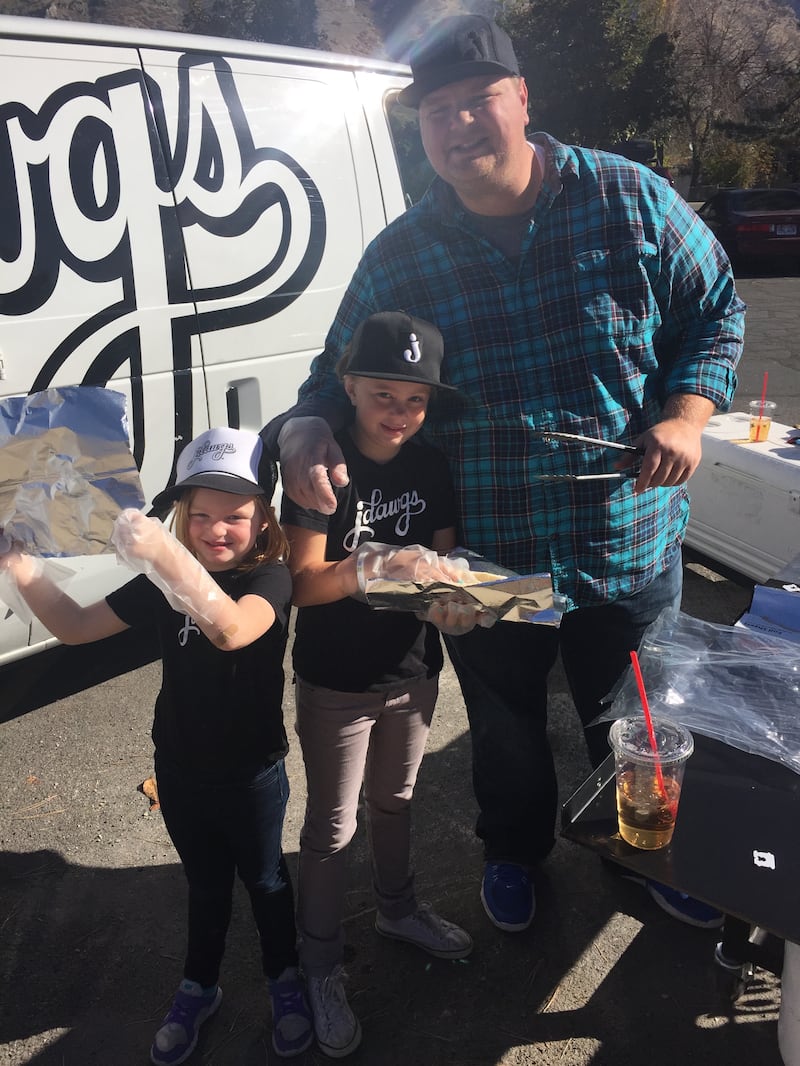
Serving up comfort
J. Dawgs’ 10th brick-and-mortar location opened in St. George last month, and Edwards spent many of his days office-bound to ensure a smooth opening — a much less familiar setting than the 10+ years he spent behind the grill.
“Grilling dogs. Cleaning tables. Taking the trash out. Chatting with customers. Those are still what I love doing the most,” Edwards says.
While he still manages to add himself to a catering run or slip into a nearby store to help, Edwards recognizes change is the only true constant. The saddest day of his two-decades-plus career, he says, was when a row of mature trees leading to the BYU campus was razed and replaced with a bus stop. Families once enjoyed that grassy area as they munched on his wares, but the area looks so different now. The first time he saw it like that, he shed tears.
But change can mean happy surprises too, whether it’s the new people he gets to meet or the experiences few others probably have. Last summer, for example, Edwards grilled dawgs at the U.S. Capitol for Sen. Mitt Romney and others. By request, he’s delivered hot dogs to newly minted mothers still in their hospital beds. His dawgs have also been requested for final meals.
“They want what they want when they die,” Edwards says. “If they’re on their deathbed and all they want is a dog and a Coke, I’m all for that.”
Edwards recognizes what his patrons would likely agree with: hot dogs provide comfort. They’re approachable — a familiar sight no matter where they are in the world or how they’re prepared.
Above all, they’re simple. He appreciates that.
“In a perfect world, J. Dawgs would still be a shack. I’d open at 10 and close at 4. But those days are gone,” Edwards says. “Theoretically, though, I’m still counting and keeping money in a jar, trying to take care of my people. So far, that’s done well for me.”

